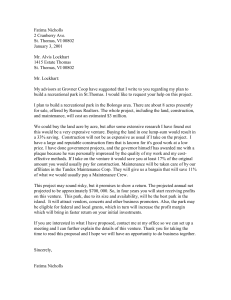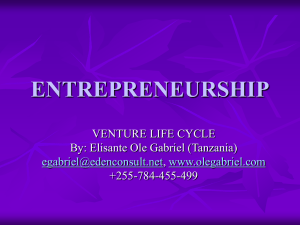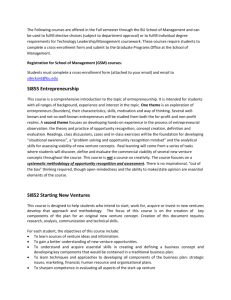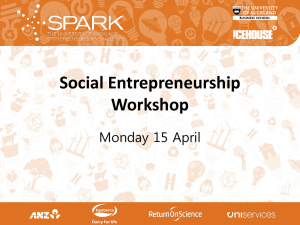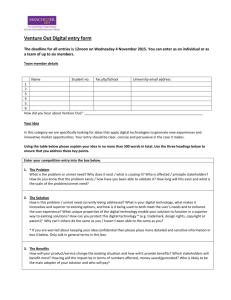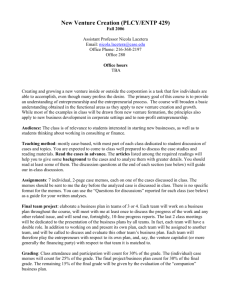Mgmt801 syllabus 2014 WEMBA-East
advertisement
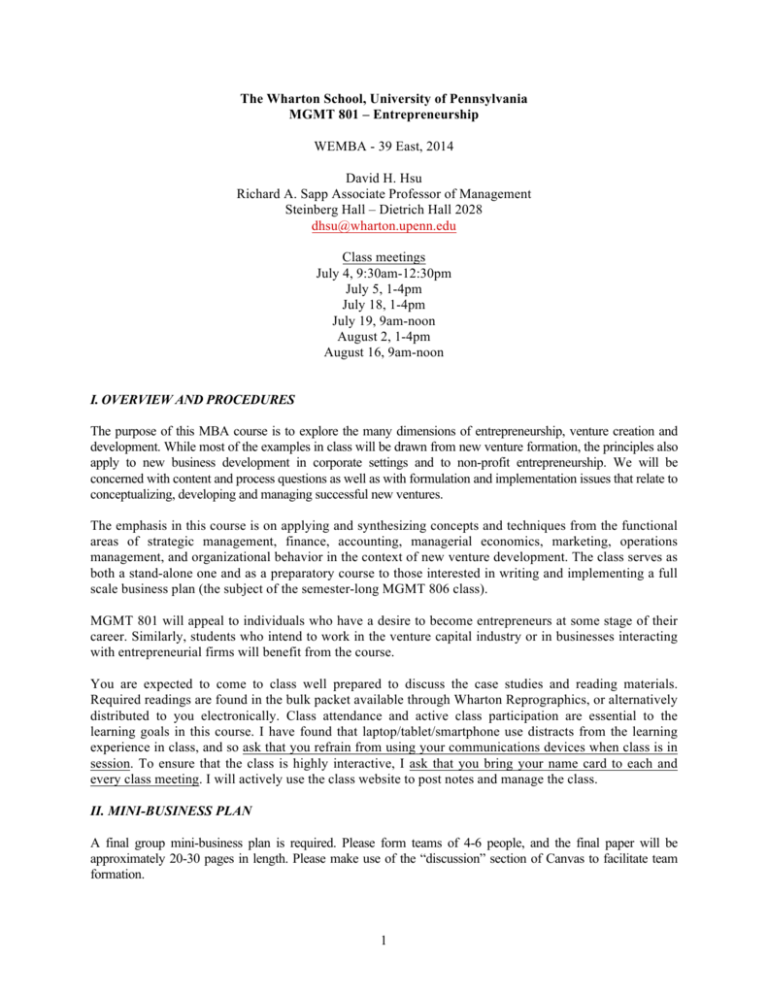
The Wharton School, University of Pennsylvania MGMT 801 – Entrepreneurship WEMBA - 39 East, 2014 David H. Hsu Richard A. Sapp Associate Professor of Management Steinberg Hall – Dietrich Hall 2028 dhsu@wharton.upenn.edu Class meetings July 4, 9:30am-12:30pm July 5, 1-4pm July 18, 1-4pm July 19, 9am-noon August 2, 1-4pm August 16, 9am-noon I. OVERVIEW AND PROCEDURES The purpose of this MBA course is to explore the many dimensions of entrepreneurship, venture creation and development. While most of the examples in class will be drawn from new venture formation, the principles also apply to new business development in corporate settings and to non-profit entrepreneurship. We will be concerned with content and process questions as well as with formulation and implementation issues that relate to conceptualizing, developing and managing successful new ventures. The emphasis in this course is on applying and synthesizing concepts and techniques from the functional areas of strategic management, finance, accounting, managerial economics, marketing, operations management, and organizational behavior in the context of new venture development. The class serves as both a stand-alone one and as a preparatory course to those interested in writing and implementing a full scale business plan (the subject of the semester-long MGMT 806 class). MGMT 801 will appeal to individuals who have a desire to become entrepreneurs at some stage of their career. Similarly, students who intend to work in the venture capital industry or in businesses interacting with entrepreneurial firms will benefit from the course. You are expected to come to class well prepared to discuss the case studies and reading materials. Required readings are found in the bulk packet available through Wharton Reprographics, or alternatively distributed to you electronically. Class attendance and active class participation are essential to the learning goals in this course. I have found that laptop/tablet/smartphone use distracts from the learning experience in class, and so ask that you refrain from using your communications devices when class is in session. To ensure that the class is highly interactive, I ask that you bring your name card to each and every class meeting. I will actively use the class website to post notes and manage the class. II. MINI-BUSINESS PLAN A final group mini-business plan is required. Please form teams of 4-6 people, and the final paper will be approximately 20-30 pages in length. Please make use of the “discussion” section of Canvas to facilitate team formation. 1 The mini-business plan involves developing an original venture idea, and will include the following areas: (1) specifying the venture concept and value proposition (and why the demand is not being met currently, or how you would generate demand for the offering); (2) an analysis of the market potential and competitive pressure for the offering; (3) financial prospects (a pro forma discovery driven plan) and statement of likely financial capital sources; and (4) analysis of the main challenges and risks associated with the offering, together with ways your team might address those challenges. The interim submission date (July 18 by 5pm), uploaded to the appropriate Canvas folder). This submission is a three page statement of the topic of your term project/mini business plan, as well as an outline of your paper. We regard this submission as a binding statement of your term project. Please make sure that names of all team members are on the submission. While you are probably aware of the conventions of properly citing material and ideas, I believe a short note on the subject is worthwhile. Material reproduced verbatim should be enclosed in quotation marks, with proper attribution made to the source. Ideas and concepts even if not quoted verbatim should be attributed to the author/source, also via proper citation. IV. COURSE GRADING • • • • 38% active class participation 5% three page team submission of mini bp topic & preliminary outline (due 5pm, 7/18) 50% term paper/mini business plan (due 10am, 8/22) 7% two-three page individual written feedback on another team’s term paper/mini business plan (due 10am, 8/29) 2 Mgmt 801: Entrepreneurship Session 1A (July 4, first half of class) Introduction & Course Overview; Issues in Team Building Read: ! “The Questions Every Entrepreneur Must Answer” by A. Bhide, Harvard Business Review, November-December 1996, pp. 120-130 (reprint 96603). ! “The New Venture Team” by J.A. Timmons, Chapter 8 in New Venture Creation, Irwin McGraw-Hill, 1999, pp. 277-287. Study question: What are the most common pitfalls facing new start-up teams? How would you design new venture policies to prevent these pitfalls? In class video: Startup.com (excerpts) Session 1B (July 4, second half of class) Entrepreneurial Opportunities Read: “Linear Air: Creating the Air Taxi Industry” HBS Case 9-808-107. Study question: What makes the proposed service an entrepreneurial opportunity for Linear Air, and how well is the venture positioned to capitalize on the opportunity? Session 2A (July 5, first half of class) Generating and Evaluating Venture Ideas Read: ! “Good Ideas and How to Generate Them” from B. Nalebuff and I. Ayres, Why Not?, Harvard Business School Press, Boston, 2003, pp. 13-42. ! “Creating New Market Space” by W.C. Kim and R. Mauborgne, Harvard Business Review, January-February 1999, pp. 83-93 (reprint 99105). Study questions: 1. How are entrepreneurial opportunities identified? 2. What are the criteria you would use to assess the viability of an entrepreneurial opportunity? 3. What leads to opportunity windows? Why do some people (and not others) identify the window? We will conduct an in-class exercise on generating and evaluating venture ideas. Session 2B (July 5, second half of class) Business Plans, Business Designs and Business Models Read: 3 ! ! “How to Write a Great Business Plan” by W.A. Sahlman, Harvard Business Review, July-August 1997, pp.98-108 (reprint 97409). “Zipcar: Refining the Business Model,” HBS Case 9-803-096. Study question: What is Zipcar’s business model, and how has the model changed? What changes, if any, would you make to the business model? Session 3A (July 18, first half of class) Start-up Strategy/Judo Strategy Read: ! “Mastering Balance: How to Meet and Beat a Stronger Opponent” by D. Yoffie and M. Kwak, California Management Review, Winter 2002, pp. 8-24. ! “Judo in Action” HBS 9-703-454. Study question: How can new ventures compete against established firms, which have both more resources and an established reputation? Session 3B (July 18, second half of class) Discovery Driven Planning Read: ! “Discovery Driven Planning” by R.G. McGrath and I.C. MacMillan, Harvard Business Review, July-August 1995. ! Market Watch on-line case, Wharton School. Homework: Set up a sketch discovery-driven plan for Market Watch (note: the end of the case mentions that there is a pre-existing spreadsheet. There is no such worksheet; your homework is to sketch out the spreadsheet prior to class—which we will refine in teams during class). In-class exercise (bring your laptop computer—you will need access to Excel): Get together in study groups. Compare and extend the discovery driven plans you have constructed for Market Watch. Be prepared to possibly present your spreadsheet to the class. Please upload to Canvas your team’s statement of mini-business plan topic by 7/18 at 5pm. Session 4A (July 19, first half of class) Financing New Ventures Read: ! Skim: “Introduction” to The Venture Capital Cycle by P. Gompers and J. Lerner, MIT Press, 1999, pp. 1-16. ! “Walnut Venture Associates (A),” HBS case 9-899-062, pp. 1-11 only. ! “Walnut Venture Associates (D),” HBS case 9-899-097. 4 ! Refer to the following reference for any legal terms you are unfamiliar with in the Walnut (D) case: “Venture Capital” by Bagley and Dauchy, The Entrepreneur’s Guide to Business Law, 1998. Study Questions: 1. Taking the perspective of Wagner, what areas of the business plan require more due diligence? How would you propose getting such information? 2. Put yourself in O’Connor’s shoes. What do you think the investors are trying to accomplish with the term sheet? What proposed terms do you find most troubling, and why? Session 4B (July 19, second half of class) Extended Elevator Pitches Each team will have a short amount of time to present the essence of their mini business plan and receive feedback from your peers. Details will be announced in class. Session 5A (August 2, first half of class) Managing Growth Read: ! “Note on Building the Self-Sustaining Firm” by A. Bhide, HBS Note 9-395-200. ! “Anasazi Exclusive Salon Products, Inc.,” HBS case 9-295-111. Study Question: Do you agree with Anasazi’s new strategic plan to meet its milestones? Why or why not? What specific managerial action should be taken to implement the recommendations? Note: We will be simulating a board meeting, as suggested by the case. Come prepared to play the role of entrepreneur AND of venture capitalist. I will randomly assign representatives to engage in the role play during class. Session 5B (August 2, second half of class) Harvesting and/or Learning from Failure Read: ! “The Harvest and Beyond” by J.A. Timmons, Chapter 18 in New Venture Creation, Irwin McGraw-Hill, 1999, pp. 573-580. ! “Nantucket Nectars,” HBS case 9-898-171. Study Question: Should Nantucket Nectars undergo an IPO or sell a part of the company? If you recommend the latter, who should it sell to and why? Note: we will simulate a meeting in which the founders of Nantucket Nectars hire you as an investment banker to advise the company on harvesting. Please come prepared to role play and discuss the pros and cons of each of the options outlined at the end of the case. 5 Session 6A (August 16, first half of class) Entrepreneurship within Established Corporations Read: “3M Optical Systems: Managing Corporate Entrepreneurship” HBS case 9-395-017. Study Questions: 1. In what ways is entrepreneurship different in the context of an established firm relative to an independent start-up? 2. As Andy Wong in the 3M case, how would you handle the authorization for expenditure (AFE) for the relaunch of the privacy screen? 3. As Paul Gehler in the 3M case, would you approve the AFE if Wong sent it to you? Session 6B (August 16, second half of class) Course Wrap-up Read: ! “Vermeer (A): A Company is Born,” HBS 9-397-078 ! “Vermeer (C): Negotiating the Future,” HBS 9-397-081 Study questions: ! As Charles Ferguson in the Vermeer (A) case, would you accept the venture capital offer? Why or why not? ! As the Vermeer management team in the Vermeer (C) case, would you agree to the Microsoft buyout? Why or why not? Final papers (for all teams) are due August 22 at 10am – uploaded to the website (no paper copy needed). LATE PAPERS WILL NOT BE ACCEPTED! Individual written comments on another team’s term project (assigned to you) due August 29 at 10am (comments will be shared with your colleagues!) 6

